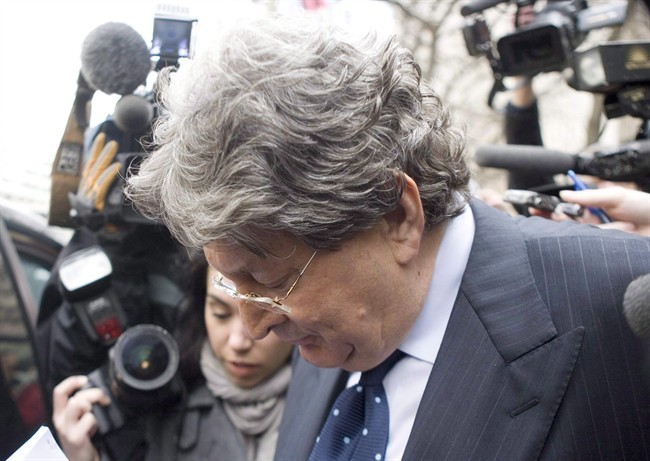TORONTO – Garth Drabinsky wants to know why he was stripped of his Order of Canada, but disgraced sprinter Ben Johnson and a priest convicted of assault were not.

The former theatre mogul has started a new round in court as he battles to reclaim the honour, which was stripped away while he served his prison sentence for fraud.
The Federal Court last month dismissed Drabinsky’s bid for judicial review, in which he had asked the court to declare the decision of the Order of Canada advisory council unlawful.
READ MORE: Disgraced theatre mogul Garth Drabinsky granted full parole after emotional hearing
The ex-CEO of the now-defunct Livent Inc. has filed a notice of appeal, seeking to overturn that decision.
He argues it’s unfair that he didn’t have a proper opportunity to make submissions to the Order of Canada advisory council, since he was still in prison when the council informed him it was considering terminating his appointment to the order.
If he had the chance to send the advisory council complete written arguments, he would have raised the cases of other officers and members of the Order of Canada who have criminal convictions or sanctions from a professional body, Drabinsky writes in his notice of appeal.
READ MORE: Conrad Black stripped of the Order of Canada
Drabinsky, who was recently granted full parole, cited several examples of people who were not stripped of their orders in such circumstances. Ben Johnson remained in the order despite being stripped of his Olympic gold medal in a doping scandal.
- Canadian man dies during Texas Ironman event. His widow wants answers as to why
- ‘Shock and disbelief’ after Manitoba school trustee’s Indigenous comments
- Several baby products have been recalled by Health Canada. Here’s the list
- ‘Sciatica was gone’: hospital performs robot-assisted spinal surgery in Canadian first
Rev. Lucien Larre was not removed from the order after his 1992 conviction for common assault and one of administering a noxious substance to residents of a home for troubled youth. Larre later returned the order on his own, in protest of Dr. Henry Morgentaler’s inclusion in the order.
“Such information would serve to demonstrate that the constitution of the Order of Canada and the policy and procedure do not make the fact of conviction of a criminal offence alone a sufficient basis to terminate an appointment to the order,” Drabinsky wrote.
He would tell the advisory council, if he had the chance, about his contributions to Canada, “both culturally and economically,” that endure, Drabinsky indicated in his notice of appeal.
He would also put forward “personal stories of people in Canada whose lives were significantly enhanced by the opportunities offered to them in his productions both before and after his appointment,” Drabinsky wrote.
Drabinsky and business partner Myron Gottlieb were convicted in 2009 in a book-cooking scheme that led to the bankruptcy of their publicly traded company, behind such hits as “Phantom of the Opera” and “Ragtime.”
A criminal conviction does not mean automatic removal from the order.
The advisory council’s termination policy is to also consider whether a person’s actions constitute “a significant departure from generally recognized standards of public behaviour which is seen to undermine the credibility, integrity or relevance of the Order, or detracts from the original grounds upon which the appointment was based.”

Comments